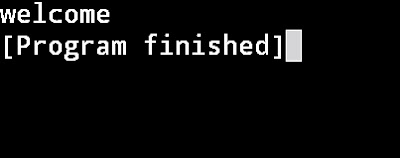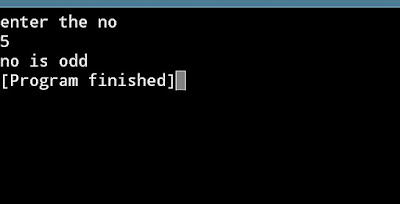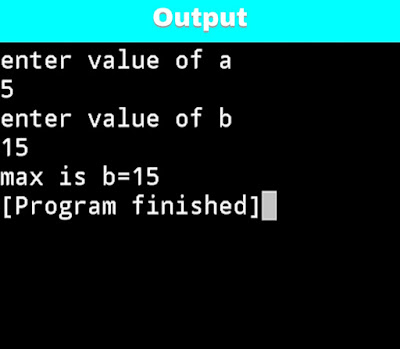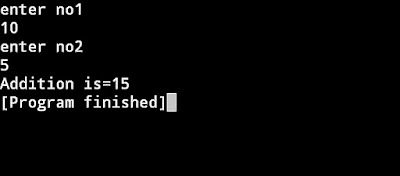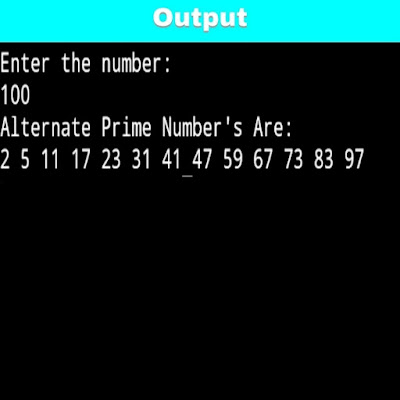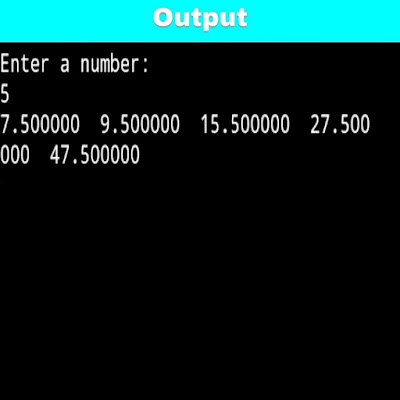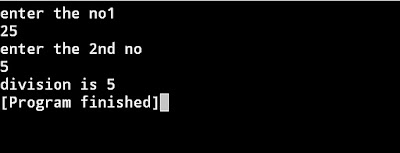C Program To Print Number Is Even or Odd Without Using "if-else" Statement Using "Switch-Case"
Program to Print number is even or odd without using if-else statement using switch case:
#include<stdio.h>
int main()
{
int no;
printf("enter the no\n");
scanf("%d",&no);
#include<stdio.h>
int main()
{
int no;
printf("enter the no\n");
scanf("%d",&no);
C Program To Print Maximum Number Between Two Numbers Using Switch Case
Ex: write a C program to find maximum number between two numbers without using if-else using switch case. How to write a C program to find maximum number between two numbers without using if-else using switch case.
c program to print maximum out of two numbers without using if-else statement using Switch Case.
Input from user:
Enter value of a: 5
Enter value of b: 15
Expected Output:
Maximum is b=15.
In below code we will print max out of two numbers without using if-else statement's. Here we will use switch-case to find the max number of given two numbers.
Step by Step Logic of the program:
1. First we will accept two numbers from user which say a & b.
2. After that we will store the output of a/b in the switch. Switch (a/b)
3. If output in zero then case 0 will work means max is b.
4. Otherwise in default- a is max.
#include<stdio.h>
int main()
{
int a,b;
printf("enter value of a\n");
scanf("%d",&a);
printf("enter value of b\n");
scanf("%d",&b);
switch(a/b)
{
case 0:
printf("max is b=%d",b);
break;
default:
printf("max is a=%d",a);
}
return 0;
}
Above Program show's the following output:
c program to print maximum out of two numbers without using if-else statement using Switch Case.
Input from user:
Enter value of a: 5
Enter value of b: 15
Expected Output:
Maximum is b=15.
In below code we will print max out of two numbers without using if-else statement's. Here we will use switch-case to find the max number of given two numbers.
Step by Step Logic of the program:
1. First we will accept two numbers from user which say a & b.
2. After that we will store the output of a/b in the switch. Switch (a/b)
3. If output in zero then case 0 will work means max is b.
4. Otherwise in default- a is max.
C Program To Print Maximum Number Between Two Numbers Using Switch Case:
#include<stdio.h>
int main()
{
int a,b;
printf("enter value of a\n");
scanf("%d",&a);
printf("enter value of b\n");
scanf("%d",&b);
switch(a/b)
{
case 0:
printf("max is b=%d",b);
break;
default:
printf("max is a=%d",a);
}
return 0;
}
Above Program show's the following output:
C Program To Reverse the String without using "strrev()" function
Ex: Write a C Program To Reverse the String without using "strrev()" function. How to write a C Program To Reverse the String without using "strrev()" function. C Program To Reverse the String without using "strrev()" function.
Program:
#include<stdio.h>
#include<string.h>
void main()
{
char a[100],b[100];
int i,j,len;
printf(" \n Please Enter Any String : ");
gets(a);
j=0;
#include<stdio.h>
#include<string.h>
void main()
{
char a[100],b[100];
int i,j,len;
printf(" \n Please Enter Any String : ");
gets(a);
j=0;
/*Calculate length of string using strlen() function and store result in variable len*/
len=strlen(a);
len=strlen(a);
//Run for loop from len-1 to 0.
for(i=len-1;i>=0;i--)
{
C Program to Reverse the Given String Using String Function
Ex: Write a C program to reverse the given string using String function. How to write a C program to reverse the given string using String function. C program to reverse the given string using String function.
Program:
#include <stdio.h>
#include <string.h>
void main()
{
char s[100];
//Accept string from user using gets() function
printf("\n Please Enter Any String : ");
gets(s);
//Reverse the given string using strrev() function
strrev(s);
//Print reversed string on the output screen
printf("\n string After Reversing : %s\n", s);
}
Above Program show's the following output:
#include <stdio.h>
#include <string.h>
void main()
{
char s[100];
//Accept string from user using gets() function
printf("\n Please Enter Any String : ");
gets(s);
//Reverse the given string using strrev() function
strrev(s);
//Print reversed string on the output screen
printf("\n string After Reversing : %s\n", s);
}
Above Program show's the following output:
C Program To Print Sum Of Two Numbers Without Using Arithmetic '+' Operator
Ex: Write a C Program To Print Sum Of Two Numbers Without Using Arithmetic '+' Operator. How to write a C Program To Print Sum Of Two Numbers Without Using Arithmetic '+' Operator. C Program To Print Sum Of Two Numbers Without Using Arithmetic '+' Operator.
Input from user:
Enter number 1: 10
Enter number 2: 5
Expected output:
Sum = 15
Program:
#include<stdio.h>
void main()
{
int no1,no2,no3;
printf("enter no1\n");
scanf("%d",&no1);
printf("enter no2\n");
scanf("%d",&no2);
C Program to Print Alternate Prime Numbers from 1 to n
Ex: Write a C program to print alternate prime numbers from 1 to n. How to write a C program to print alternate prime numbers from 1 to n. C program to print alternate prime numbers from 1 to n.
Input from user:
Enter the number: 100
Expected output:
2 5 11 17 23 31 41 47 59 67 73 83 97
- What is prime number?
Prime number means a number that is divisible only by 1 and itself.
Step by step logic of the given program:
1. Accept input from user declare variable say no.
2. Declare e=2.
3. Run one outer for loop from 1 to no:
for(i=1;i<=no;i++)
4. Run one inner for loop from 1 to i and inside that check condition if i%j == 0 then increment c by 1:
for(j=1;j<=i;j++)
{
if(i%j==0)
{
c++;
}
}
5. After that outside the inner for loop check if c==2 (it means if given number is prime) then, inside that if-statement check one more condition if e%2==0 means if e is even number then print value of i (it prints prime numbers only if e is completely divisible by 2, in short it prints alternate prime numbers):
if(c==2)
{
if(e%2==0)
{
printf("%d ",i);
}
6. After that, Outside the block of inner if statement increment value of e by 1.
7. Last make c=0.
Program to Print Alternate Prime Numbers:
#include<stdio.h>
void main()
{
int no,i,j,c=0,e;
printf("Enter the number:\n");
scanf("%d",&no);
e=2;
printf("Alternate Prime Number's Are:\n");
for(i=1;i<=no;i++)
{
for(j=1;j<=i;j++)
{
if(i%j==0)
{
c++;
}
}
if(c==2)
{
if(e%2==0)
{
printf("%d ",i);
}
e=e+1;
}
c=0;
}
}
Above Program show's the following output:
C program to print following numbers series 7.5 9.5 15.5 27.5 47.5
Ex: Write a C program to print following numbers series 7.5 9.5 15.5 27.5 47.5...How to write a C program to print following numbers series 7.5 9.5 15.5 27.5 47.5.....C program to print following numbers series 7.5 9.5 15.5 27.5 47.5.
Input from user:
Enter a number: 5
Expected output:
7.5 9.5 15.5 27.5 47.5
Program:
#include<stdio.h>
void main()
{
int i,no;
float z=7.5;
#include<stdio.h>
void main()
{
int i,no;
float z=7.5;
printf("Enter a number:\n");
scanf("%d",&no);
C program to devide the intiger number without using division "/" sign
Ex: Write a C program to devide the intiger number without using division "/" sign. How to write a C program to devide the intiger number without using division "/" sign. C program to devide the intiger number without using division "/" sign.
Input from user:
Enter number1: 25
Enter number2: 5
Expected output:
Division is 5
Program:
#include<stdio.h>
void main()
{
int no1,no2,c=1;
#include<stdio.h>
void main()
{
int no1,no2,c=1;
printf("enter the no1\n");
scanf("%d",&no1);
printf("enter the 2nd no\n");
scanf("%d",&no2);
Subscribe to:
Comments (Atom)


